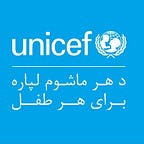“Clean water is our doctor”
Safe water, sanitation and hygiene in schools is transforming education and changing students’ lives
©UNICEF Afghanistan/2017/Mansoory
BALKH and JAWZJAN provinces, Afghanistan, September 2017 — The physical environment and cleanliness of a school facility is essential for the health and well-being of children, yet too often schools are places where children become ill.
“Water is the main source of life. We can tolerate a week without food but it is really hard to tolerate a day without water.” — ZAINAT, 18, Balkh province
Spending long hours in schools where disease spreads quickly in cramped spaces with limited ventilation, where hand-washing facilities or soap are not available, and where toilets are in disrepair or non-existent can have devastating consequences for children’s health and education. For girls, the problem is only made worse if they cannot access a safe and clean space during menstruation.
UNICEF in Afghanistan provides support for water, sanitation and hygiene in schools, including menstrual hygiene management rooms for girls, and works with teachers, principals, and school committees to ensure a clean, safe and healthy school environment.
“I can’t forget those days when I would ask my friends to go with me somewhere hidden and far away because there was no toilet. But now, I am so happy that one our biggest problems for spending the day in school has been solved. We have promised to keep it clean and in [good condition] as long as we can.”
— FEROZA, 11, Balkh province
©UNICEF Afghanistan/2017/Mansoory
“We had menstrual hygiene classes recently and it was so important [to talk about these issues]. During her period, a girl loses a lot of blood, which makes her weak. We need to know what foods to eat during those times and how to keep ourselves clean. Before the water project, we didn’t have water at school and had to bring it from far away. It was dirty. Now we have a water pipeline that brings water we can drink and trees are even starting to grow around the yard.”
— ARJOMAND, 18, Balkh province
“Because our school has no surrounding walls, we didn’t use to feel comfortable when we went outside to use the toilet. Now there’s a new building with clean and modern toilets… and they have locks, so we feel safer.”
— FAZILA, 12, Balkh province
“Before, boys and girls shared the same toilet so we usually had to wait until we got home. But now we are comfortable because we have new modern facilities. It’s especially important during menstrual cycles.”
“My worst memory is when the school was locked down [because of fighting] and insecurity in the area. “Fortunately school has reopened. I’m still afraid but I’m proud I made it through 12 years of school.”
— NAJIA,19, Jawzjan Province, has 14 siblings. Her brothers are unemployed but she plans on becoming a journalist so she can deliver positive news about Afghanistan to the world.
“We have to take care of ourselves and of all things around us. If we have a clean environment, then we can have a clean society.”
“Before we had the pipeline and water tank at school, we had to bring water from a river. That wasn’t healthy. And before we had toilets, we used to have to walk out to an open area, accompanied by friends […] so it’s much better today.
— RAIZULLAH, 15, Balkh province
“Clean drinking water, modern toilets and green spaces make all the students happier to be here. We need to be supported to come to school, so that we can support our community and society in the future.”
— MASOUDA, 15, Jawzjan province. Her perseverance and enthusiasm for school is so great that despite being diagnosed with rheumatism, she endures an eight kilometres walk every day to get to school. Her family cannot afford a car, but sometimes her father accompanies her on foot. She dreams of becoming a police officer and wants to stop anyone who would prevent her and her friends from going to school.
Water, Sanitation and Hygiene (WASH) in Schools projects in the northern region of Afghanistan are supported in part by generous donations from the people and the Government of the Republic of Finland.
